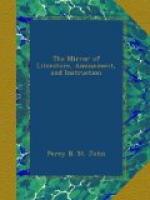“We proceeded to our guide’s house, where he introduced us, not indeed to his wives, for all these ladies were stowed away behind a screen of mats, but to some of the males of his family, and, amongst others, to a queer copper-coloured gentleman, who styled himself, in his communications with us, ‘the Duke of Devonshire,’ and begged very hard to be allowed the honour of having our linen to wash. His Grace was a little dumpy fellow, who stooped considerably, wore neither shoes nor stockings, and exhibited so little of a nose, that when you caught his countenance in profile, the facial line, as the physiognomists call it, suffered no interruption when drawn from the brow to the lips. The poor Duke little knew the cause of the laughter which his occupation, title, and the contrast of looks, excited in those of our party who had seen his grace’s noble namesake in the opposite hemisphere.”
“Most of the natives of Johanna, even the negro slaves, talk a little English; but the best examples of such acquirements were found, where they ought to be, amongst the grandees of the island. The following is a fair specimen of the conversation of the dukes and earls at the capital of the Comoros.—’How do you do, sir? Very glad see you. D—n your eyes! Johanna man like English very much. God d—n! That very good? Eh? Devilish hot, sir! What news? Hope your ship stay too long while, very. D—n my eye! Very fine day.’ After which, in a sort of whisper, accompanied by a most insinuating smile, his lordship, or his grace, as the rank of the party might be, would add:—’You want orange? You want goat? Cheap! I got good, very. You send me you clothes; I wash with my own hand—clean! fine! very! I got every thing, plenty, great, much! God d—n!’ And then, as if to clench the favourable opinion which these eloquent appeals had made, the speaker was sure to produce a handful of certificates from mates of Indiamen, masters of Yankee brigs, and middies of men-of-war; some written in solemn earnest, some quizzically, but all declaring his lordship, the bearer, to be a pretty good washerman, but the sort of person not to be trusted far out of sight, as he would certainly walk off with your clothes-bag if he could safely do so.”—Autobiography, Second Series.
* * * * *
Bed of Leaves.—In some countries the leaves of the beech tree are collected in autumn, before they have been injured by the frost, and are used instead of feathers for beds; and mattresses formed of them are said to be preferable to those either of straw or chaff.
* * * * *
Pure Style.—Cardinal Bembo was so rigorous with regard to purity of style, that he is said to have had forty different partitions, through which his writings, as he polished them by degrees, successively passed; nor did he publish them till they had sustained these forty examinations. How would the cardinal have acted with the editorship of a daily newspaper.




